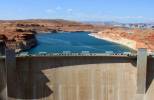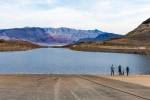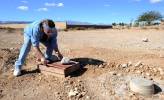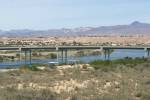Let’s preserve and enhance the Colorado River
The doctor in Las Vegas, the skier at Vail, the programmer in Phoenix, the student in San Diego and the rancher in Wyoming may not know it, but they are bound together by the Colorado River, its tributaries, and the intricate systems of dams and reservoirs that manage its water supply.
Often called the lifeblood of the West, the Colorado River grows our crops, bathes our kids, electrifies our grid, quenches our thirst, and quite literally floats our boats in seven states: Arizona, California, Colorado, Nevada, New Mexico, Utah and Wyoming.
The river defines our landscape and communities. It also provides food and shelter for the 80 percent of the region's fish and wildlife that have no choice but to call it home. For all of us, managing the river well is not optional: it is essential to our well-being and that of future generations who will call this river basin home. That was the focus of the annual conference of the Colorado River Water Users Association in Las Vegas earlier this month.
There's been a fair amount of recent news reminding us of the fact that the future of Colorado River is uncertain and could be headed for serious trouble. The drought of the past decade demonstrated that we're already using about as much water as the river can supply.
The good news is that our reservoirs, as well as new water conservation efforts and water sharing arrangements, helped us weather the drought. This past winter's record snowfall provided high flows that have helped to replenish our depleted reservoirs. In addition, governments, water users and conservation organizations have worked together to preserve and restore some of the river's water-dependent ecosystems.
The bad news is that while we have relied on the stored water to meet our current needs, additional water uses may further stress our precarious water supply. The Colorado River and the ecosystems it supports are increasingly stressed and vulnerable. The worse news is that the future may exacerbate these conditions: the Colorado River's water supply is projected to decline considerably due to climate change. In June, the U.S. Bureau of Reclamation concluded that climate change could reduce water flow in the Colorado River Basin by approximately 9 percent by 2050.
At a minimum, scientists tell us we can expect more uncertainty in year-to-year water supply, even as the basin's population continues to grow. We believe the wise course in the face of this uncertainty is to plan for a drier future and develop systems that are resilient in the face of changing conditions, balancing new uses and the environmental health of river.
Management of the Colorado River is a complex balancing act between the diverse interests of United States and Mexico, tribes, the seven basin states, individual water users, stakeholders and communities. The challenges posed by new growth and climate change may dwarf anything we faced in the past. Instead of staring into the abyss, the water users, agencies and stakeholder groups that make managing the Colorado River responsibly their business are working together, using the best science available to define the problem, and looking for solutions.
We're calling our inquiry the Colorado River Basin Study, and we want your help. As Colorado River management professionals, we have a lot of knowledge and ideas, but we know that we don't have them all.
We want ideas from the public, from you, but we need your input by Feb. 1. You can submit your suggestions by completing the online form at: http://on.doi.gov/uvhkUi.
The big question we need to answer: What are the reasonable water management options and strategies that will provide water for people, but also maintain a healthy river system? We don't believe there's a single silver bullet that will resolve all of our challenges. We want to continue to explore the benefits and costs of every possibility, from conservation to desalination to importing water from other regions.
The West was built on innovation and hard work, and that spirit is still strong. Our landscapes and communities are unparalleled in their beauty, resilience and character. The economic well-being of our rural and urban communities in the Colorado River basin is inextricably linked to the Colorado River and its environmental health.
That's why we are asking for the public's input to help us craft a study showing a path forward that supplies our communities with the water they need to thrive and protects the health of the Colorado River -- and the ecosystems and economies it supports.
Fred Krupp is the president of the Environmental Defense Fund, a leading national conservation group. David Modeer is the general manager of the Central Arizona Water Conservation District. Eric Kuhn is the general manager of the Colorado River Water Conservation District in Colorado.























